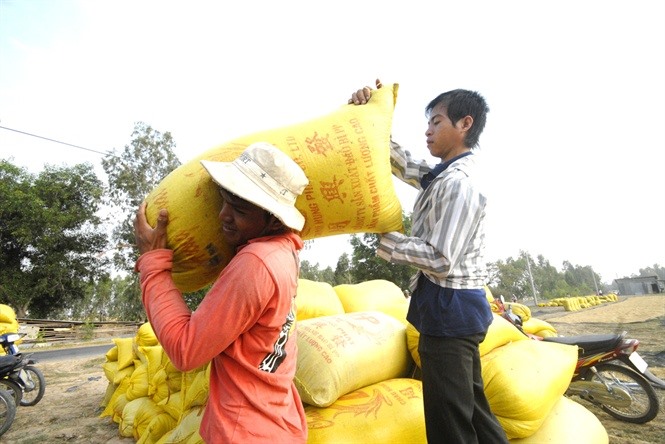 Society
Society

Many farmers in the Cửu Long (Mekong) Delta are regretting that they did not stockpile any rice as prices rise continuously and supply remains limited.
 |
| Since they sell fresh rice right after harvesting, farmers are not benefiting from rising prices. – Photo danviet.vn |
CỬU LONG DELTA – Many farmers in the Cửu Long (Mekong) Delta are regretting that they did not stockpile any rice as prices rise continuously and supply remains limited.
Rice traders, meanwhile, are also finding it difficult to get enough of the grain for exports.
The 2017 crop year is coming to an end. In provinces with large production areas and high yields, such as Kiên Giang, An Giang or Đồng Tháp, the amount of rice yet to be harvested is small, while there is no inventory as farmers have been selling their produce soon after harvesting it.
Nguyễn Minh Thiện of Kiên Giang Province’s Tân Hiệp District told the Nông Thôn Ngày Nay (Countryside Today) newspaper that his family finished harvesting three weeks ago.
“At that time, freshly harvested OM 5451 rice was selling at VNĐ5,100 (US$0.25) per kilogram. Now, it has since risen by VNĐ500 per kilogram but there is no rice left. We should have stocked dried rice to get the additional VNĐ10 million ($440) with our 18 tonnes of rice,” he said.
Lê Văn Mạnh, head of Tân Hiệp District Department of Agriculture and Rural Development (DoARD), said that local farmers had planted 34,158ha of rice with approximate productivity of 5.5 tonnes per ha.
“Most of the crop was harvested when the rice price was at average levels. Only about 10,000ha of rice were gathered when the prices rose. Since farmers no longer stock dried rice, they are disappointed about the missed chance,” said Mạnh.
An Giang Province started its harvest season late. Local farmers here say that it is rare to have rice prices rising from VNĐ300 to 600 per kilogram in such a short time.
Từ Khánh Nhơn of Châu Phú District’s Thạnh Mỹ Tây Commune is harvesting his crop. He said the farmers worked very hard to save rice fields from flooding by strengthening local dykes. Their work has paid off.
Over the last two weeks, traders have deposited VNĐ500,000 ($25) for every 0.1 ha and bought rice at VNĐ5,500 to 5,800 per kilogram, an increase of VNĐ450 to 600 per kilogram compared to the previous crop. With a productivity of 850kg, his family can earn about VNĐ2 million ($88) for every 0.1 ha.
According to the Vĩnh Long People’s Committee, because of salinisation, the rice production area has been reducing steadily. In 2017 it was 168,805ha, a drop of 7,624 ha over 2016. But productivity has been high.
Tough to get
Meanwhile, traders and enterprises are facing difficulties in collecting rice due to limited supply.
Nguyễn Thanh Nhã, a trader in Cần Thơ City’s Thới Lai District, said that he had to go to Kiên Giang and An Giang provinces for two to three days to buy just 30 tonnes of fresh rice.
“For this crop, export companies order large quantities of rice at higher prices. However, it is hard to get enough rice at this time. We have to deposit money 15 to 20 days in advance, otherwise, farmers will sell the rice to other traders,” he said.
Nguyễn Thị Kiều, deputy director of Cần Thơ City Agriculture Department, affirmed that rice prices were increasing because of limited supply. Simultaneously, in 2017, besides traditional markets like China, the province has signed several rice export contracts with news markets including Bangladesh and the Philippines.
Trần Ngọc Toàn, another trader in Vĩnh Long Province, said: “A month ago, the price was at VNĐ5,000 per kilogram, now, it is VNĐ5,400 to 5,600. So many farmers are waiting for higher prices. Three days ago, I bought about 200 ha of rice at VNĐ5,600 per kilogram, but I could not collect anything yesterday.”
Nguyễn Trung Tín, director of the Phan Minh Agricultural Company in Kiên Giang Province, said he was worried about the current situation.
“We are being challenged by the supply shortage. However, there is also a dilemma, since input prices and processing costs are rising higher than the rice prices,” he said. – VNS




